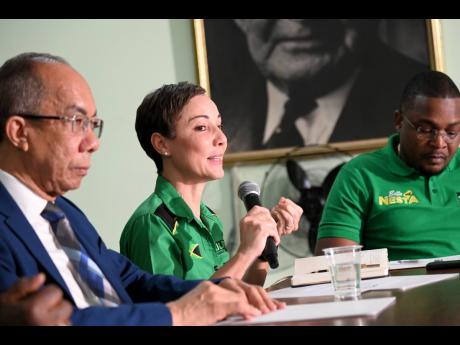Jamaica seeking 'crystal clear' interpretation before signing Samoa agreement
There is no room for negotiations by non-signatories, including Jamaica, for any terms under the new European Union/Africa Caribbean Pacific (EU/ACP) Partnership Agreement, and no benefits to be derived until countries sign, Foreign Affairs and Foreign Trade Minister Kamina Johnson Smith said yesterday.
The administration two weeks ago said it would delay signing what is now the Samoa Agreement, which replaces the Cotonou Agreement that expired in 2020, to facilitate ongoing consultations.
Yesterday, during a press conference outlining plans for Sunday’s public session of the Jamaica Labour Party's (JLP) 80th annual conference, Johnson Smith said there would be no benefit for Jamaica before that signing takes place.
“We are under the transitional arrangement now, of Cotonou, and then the Samoa agreement will require us to sign in order to benefit from the new arrangement,” Johnson Smith told The Gleaner after the press conference.
She said the Government was aware of concerns about whether the country’s sovereignty was in danger. The new treaty has provided the legal framework guiding relations between the EU's 27 nations and 79 African, Caribbean and Pacific countries.
“We are quite clear that our sovereignty will be preserved and is always at the forefront of our minds when we are having discussions and negotiations for treaties. When the Cotonou partnership arrangement was going to expire in 2020, the great push for the whole of the European Union and the Organisation of African, Caribbean and Pacific States (OACPS) which, remember, is 79 countries, Jamaica, and myself, was actually president of the Council of Ministers who received the mandate of the 79 countries for us to start the negotiations towards a post Cotonou arrangement because this is the development and funding mechanism for all 79 countries,” Johnson Smith told The Gleaner. “So, it is important and preserving the sovereignty of our individual nations was very important and has always been so we know that while when you are negotiating 79 countries with 27 countries that there are going to be differences of opinion as to what is a perfect agreement. But preserving our sovereignty, always clear.”
She also told The Gleaner that “there is nothing in the agreement that would supersede any law, any Jamaican law or any other country's law in that document as it stands".
She further explained: “There are no adjustments to be made. But what we do wish to do is to issue an interpreted declaration which will make clear the terms, where it is that there are concerns, [and] that [where] Jamaicans feel there are concerns, our understanding can be made clear to stand the test of time.
“The issue being that while we are confident that the agreement will not supersede any Jamaica law that we want it to be made clear - remember this is a 20-year agreement - that at the point of signing that the interpretation that we expect is crystal,” she stated.
The European Union provides financial support to the Government in the form of grant funding and is the largest contributor to government coffers. It has contributed billions to Jamaica in the last 40 years and is funding a number of government programmes, while also contributing to civil society organisations and programmes run by them.
During a recent post Cabinet press conference, Johnson Smith told journalists that, “throughout the negotiations which concluded in 2021, the Government took on board the views of various stakeholders including members of civil society. But the Jamaica Coalition of Healthy Society said that, for 27 months, itself and seven other Jamaican NGOs have been impressing upon the Ministry of Foreign Affairs and Foreign Trade to take heed of the “obvious threats to Jamaica’s national sovereignty in the current language of the agreement".
A release from the body and supported by several citizens groups including religious organisations cited what is termed the “glaring danger” of multiple clauses, that would bind Jamaica to undefined human rights obligations and tied to trade sanctions.
The concerned groups cited (Article 101(7) General Pact) and noted that the new agreement would reintroduce Comprehensive Sexuality Education (CSE) back into schools despite parents’ outrage in 2012 with regards to CSE’s sexualising content (Article 48(7) Caribbean Pact); trap the nation in yet-to-be-negotiated international instruments (Article 36(2) General Pact), and demand the acceptance of terms that directly threaten citizens’ freedom of conscience and speech (Article 9(2) and Article 20(1), General Pact) among other concerns. At least six bodies and individuals have urged the Government to sign the new agreement.

